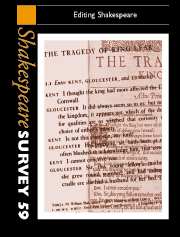Book contents
- Frontmatter
- Editing Shakespeare’s Plays in the Twentieth Century
- Crisis in Editing?
- On Being a General Editor
- Altering the Letter of Twelfth Night: ‘Some are born great’ and the Missing Signature
- ‘A Thousand Shylocks’: Orson Welles and The Merchant of Venice
- The Date and Authorship of Hand D’s Contribution to Sir Thomas More: Evidence from ‘Literature Online’
- Ferdinand’s Wife and Prospero’s Wise
- Editing Stefano’s Book
- Manuscript, Print and the Authentic Shakespeare: The Ireland Forgeries Again
- The Author, the Editor and the Translator: William Shakespeare, Alexander Chalmers and Sándor Petofi or the Nature of a Romantic Edition
- Women Edit Shakespeare
- The Shakespeare Edition in Industrial Capitalism
- Print and Electronic Editions Inspired by the New Variorum Hamlet Project
- The Evolution of Online Editing: Where Will it End?
- The Director as Shakespeare Editor
- The Editor as Translator
- Performance Editions, Editing and Editors
- Editing Collaborative Drama
- Will in the Universe: Shakespeare’s Sonnets, Plato’s Symposium, Alchemy and Renaissance Neoplatonism
- Giants and Enemies of God: The Relationship between Caliban and Prospero from the Perspective of Insular Literary Tradition
- Shakespeare’s Ages
- Who Wrote William Basse’s ‘Elegy on Shakespeare’?: Rediscovering a Poem Lost from the Donne Canon
- ‘Sometime a Paradox’: Shakespeare, Diderot and the Problem of Character
- Shakespeare Performances in England, 2005
- Professional Shakespeare Productions in the British Isles, January–December 2004
- The Year's Contributions to Shakespearian Study 1 Critical Studies
- 2 Shakespeare in Performance
- 3 Editions and Textual Studies
- Index
The Editor as Translator
Published online by Cambridge University Press: 28 March 2007
- Frontmatter
- Editing Shakespeare’s Plays in the Twentieth Century
- Crisis in Editing?
- On Being a General Editor
- Altering the Letter of Twelfth Night: ‘Some are born great’ and the Missing Signature
- ‘A Thousand Shylocks’: Orson Welles and The Merchant of Venice
- The Date and Authorship of Hand D’s Contribution to Sir Thomas More: Evidence from ‘Literature Online’
- Ferdinand’s Wife and Prospero’s Wise
- Editing Stefano’s Book
- Manuscript, Print and the Authentic Shakespeare: The Ireland Forgeries Again
- The Author, the Editor and the Translator: William Shakespeare, Alexander Chalmers and Sándor Petofi or the Nature of a Romantic Edition
- Women Edit Shakespeare
- The Shakespeare Edition in Industrial Capitalism
- Print and Electronic Editions Inspired by the New Variorum Hamlet Project
- The Evolution of Online Editing: Where Will it End?
- The Director as Shakespeare Editor
- The Editor as Translator
- Performance Editions, Editing and Editors
- Editing Collaborative Drama
- Will in the Universe: Shakespeare’s Sonnets, Plato’s Symposium, Alchemy and Renaissance Neoplatonism
- Giants and Enemies of God: The Relationship between Caliban and Prospero from the Perspective of Insular Literary Tradition
- Shakespeare’s Ages
- Who Wrote William Basse’s ‘Elegy on Shakespeare’?: Rediscovering a Poem Lost from the Donne Canon
- ‘Sometime a Paradox’: Shakespeare, Diderot and the Problem of Character
- Shakespeare Performances in England, 2005
- Professional Shakespeare Productions in the British Isles, January–December 2004
- The Year's Contributions to Shakespearian Study 1 Critical Studies
- 2 Shakespeare in Performance
- 3 Editions and Textual Studies
- Index
Summary
In a world in which scholarly communication is increasingly monolingual and where scholars no longer need feel embarrassed if they only consult studies in one language, it may be strange to raise the issue of translation in editing Shakespeare. But there are at least two reasons to do so: it is much more common than one may think, and it offers opportunities that may lead to useful contributions to Shakespeare studies. Provocatively, an edition might be called a translation manqué.
Even editors of ‘monolingual’ editions, of course, keep translating, from early modern English into the language of their twenty-first-century audience. They may not see their work as such, because of their sense that Shakespeare and their audience are part of the same culture; indeed, one of the motives for editing and re-editing his works is certainly to keep this sense alive. But just because editors are aware that this commonality of culture has its limits they will add glosses, where necessary; in N. F. Blake’s words, ‘the impression is given that provided the odd difficult word is translated, there should be no difficulty in understanding what Shakespeare wrote’.
Translation also plays a subtle, but consequential role in the modernization of spelling. The issues involved are particularly difficult where modern spelling forces the editor to narrow down early modern meanings, e.g. when having to choose between the modern spellings travel and travail, or metal and mettle. According to Stanley Wells
a modernizing editor should select what he regards as the primary meaning, irrespective of the original spelling, print this, and annotate the secondary meaning.
- Type
- Chapter
- Information
- Shakespeare Survey , pp. 193 - 197Publisher: Cambridge University PressPrint publication year: 2006

